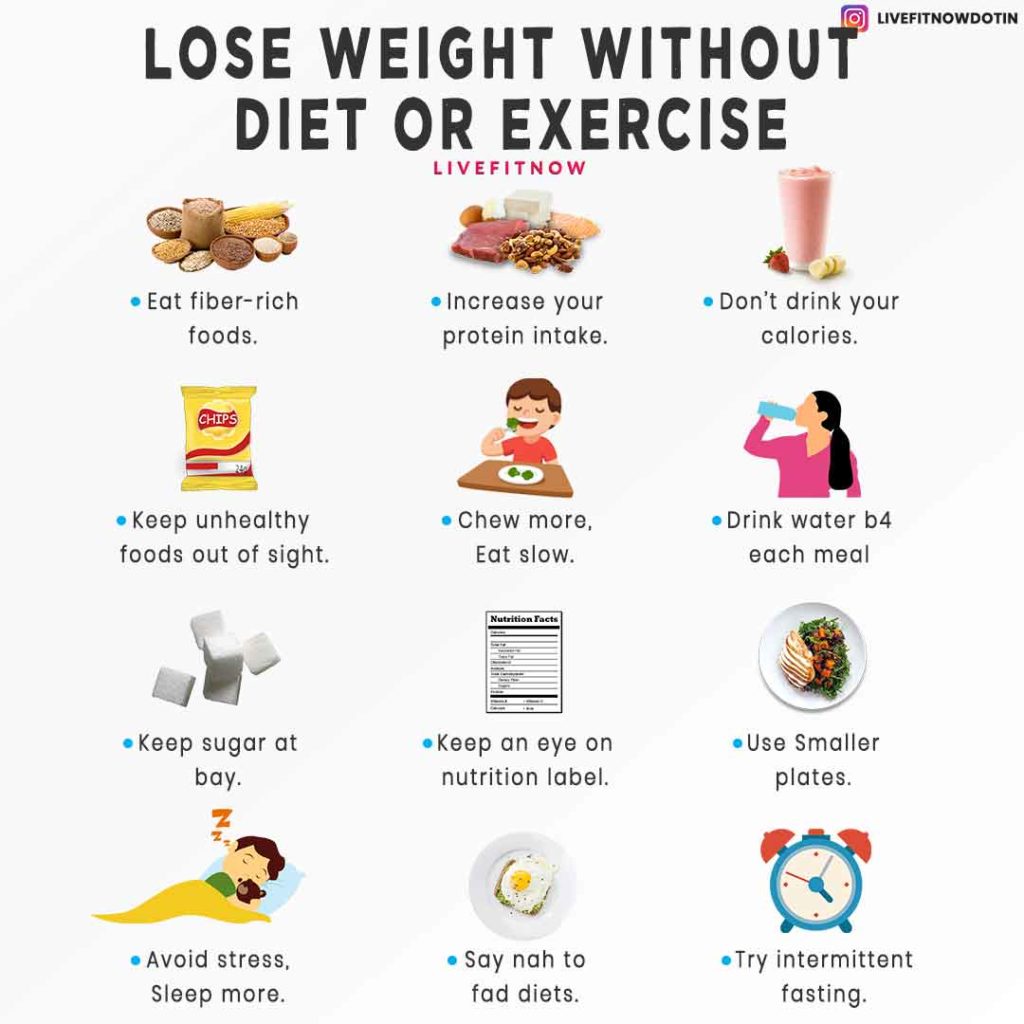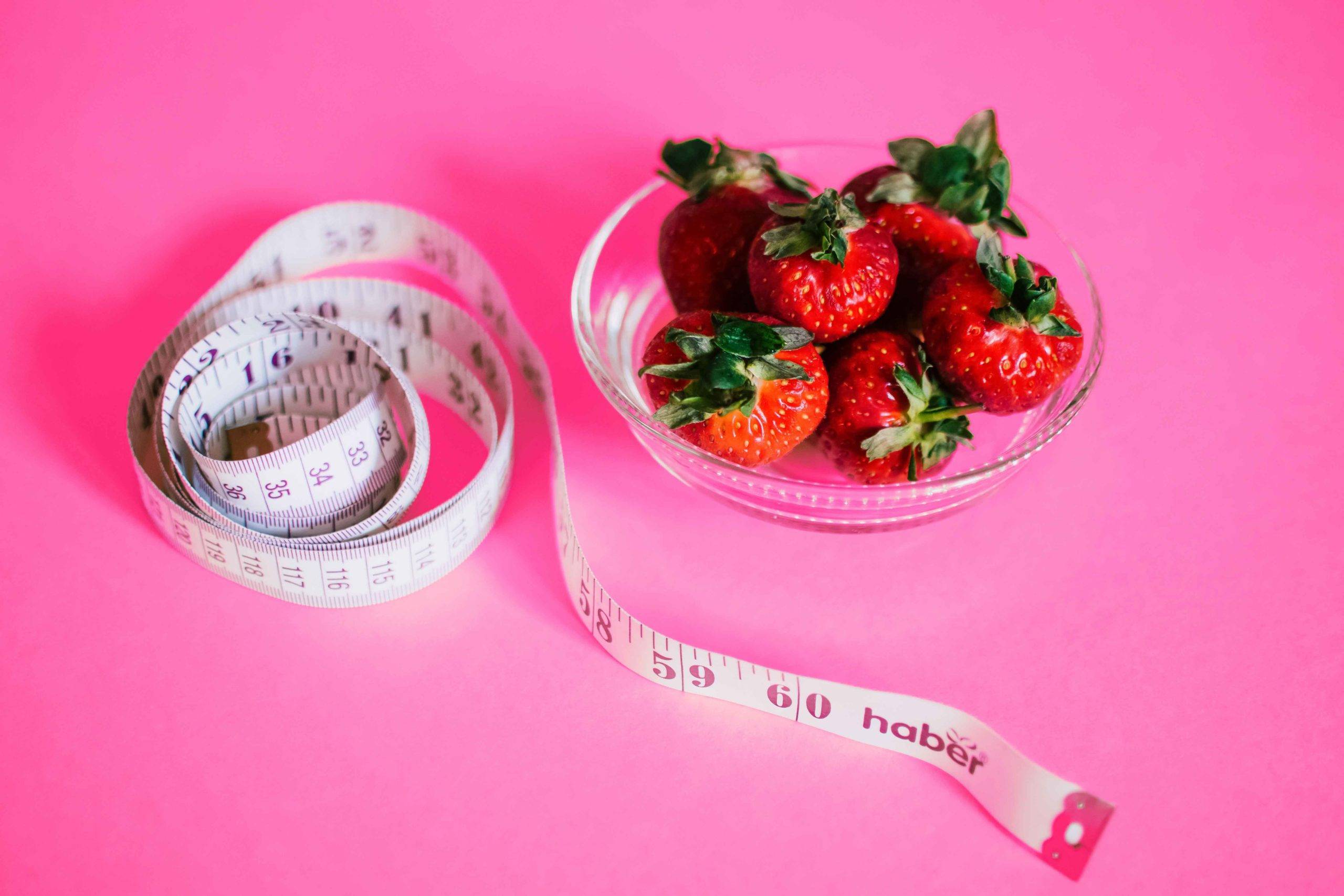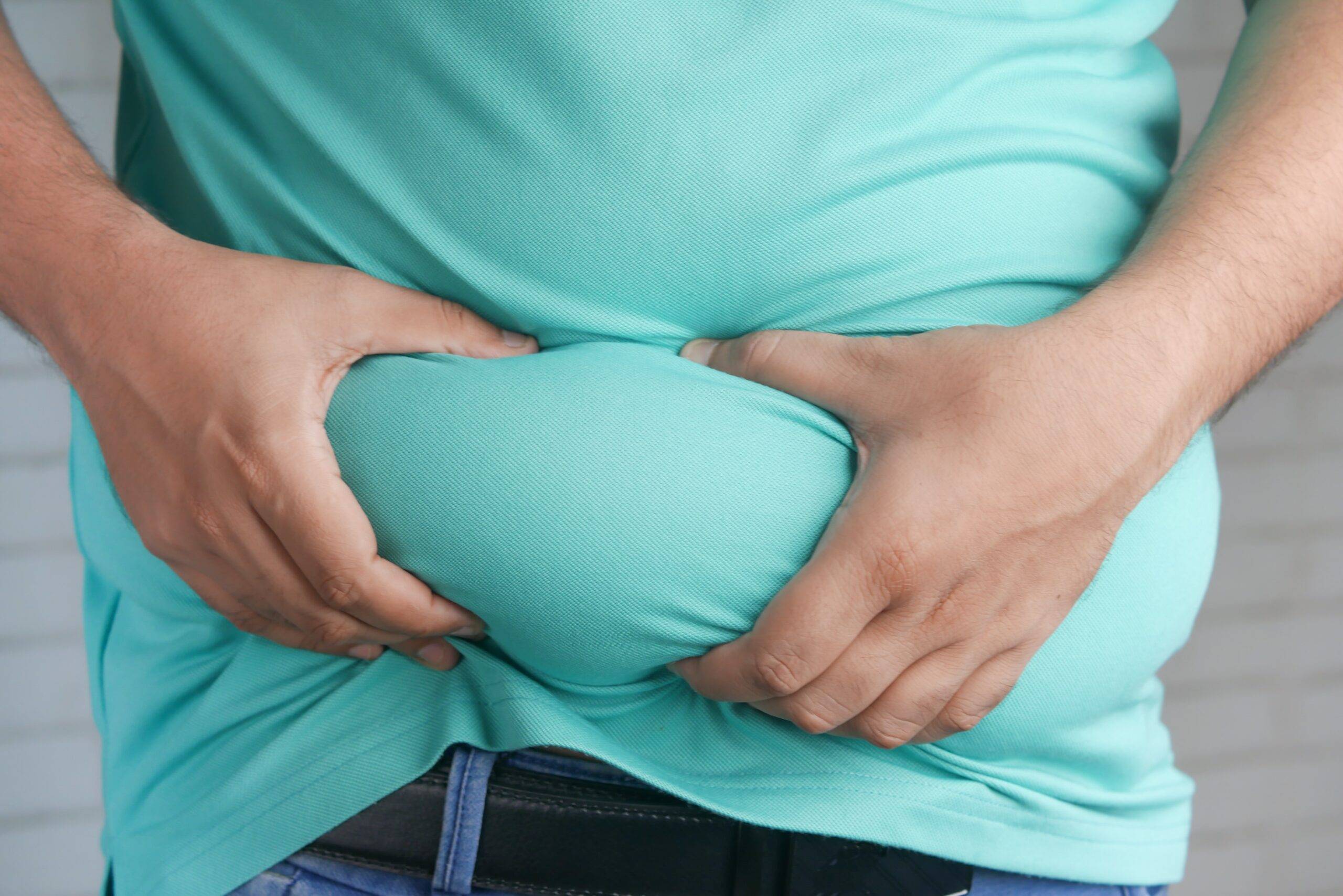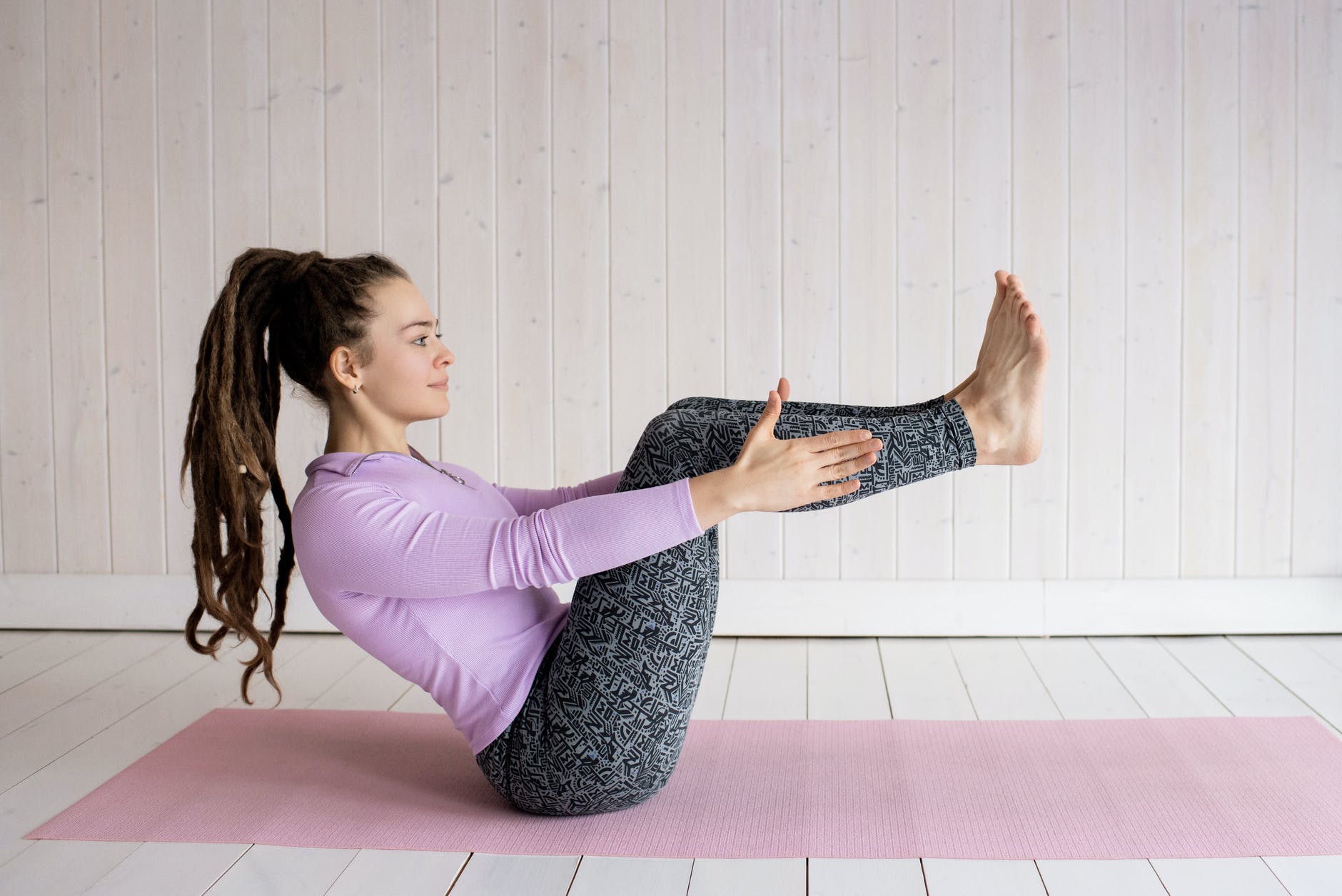Not a gym or diet fan? That’s fine! you can lose weight without exercise or following a carb cycling diet.
According to science, weight loss is only achievable by creating a negative energy balance.
You can create a negative energy balance either by following a calorie deficit diet (eating fewer calories) or by burning more calories than you consume.
However, there are several ways to eat fewer calories and lose weight easily.
Check out these 13 science-based tips to lose weight without diet or exercise.

1. Eat Foods Rich in Fiber
Eating foods high in fiber can help you lose weight in so many ways. One of the main reasons for eating fiber is to increase satiety and fullness.
Soluble fiber has been found to be helpful in weight loss. It increases fullness and makes you less prone to overeating. (21)
Soluble fiber turns into a gel when mixed with water and increases the amount of time glucose move into your bloodstream.
This delays the emptying of stomach and makes you feel full for long time.
Sources of soluble fiber include beans, lentils, oats, flax-seeds, nuts, and seeds.
2. Up Your Protein Intake
Whether your goal is to build muscles or burn fat fast, protein plays a very important role.
Losing weight is not just about eating less. It’s more about feeling less hungry, feeling full, and avoid overeating.
Protein provides all these powerful benefits and helps you eat fewer calories without feeling hungry. (1)
One study found that consuming 30% daily calories from protein helps participants eat 440 fewer calories/day and lose 4.9 kg in 12 weeks despite any additional change in diet. (12)
Sources of protein foods include eggs, meat, fish, lentils, quinoa, soybean, etc.
3. Don’t Drink Calories
Drinking food allows you to consume a lot of calories in less time which could be beneficial for weight gain not for weight loss.
Eating food triggers satiety hormones that makes you feel full. Also, prolonged chewing decreases food intake. (2)
If you are on go, drinking your calories isn’t that bad but always choose drinks high in fiber, protein, and less in sugar.
In my opinion, you should prefer eating instead of drinking if your goal is to lose weight without exercise. Because chewing burn more calories than gulping.
4. Keep Healthy Snacks in Stock
Snacking between meals promotes satiety and suppresses over-consumption at the following meal. (3)
However, it depends on the type and quality of snacks.
People tend to eat whatever food catches their eyes as a snack. So, it’s always a good idea to store healthy snacks in front and unhealthy out of sight.
Research indicates that storing unhealthy foods where visible trigger hunger, cravings, and cause you to eat more. (112)
Some healthy snacks include nut, flax-seeds, yogurt, peanut butter, and kale chips. See this post for late-night healthy snacks.
5. Chew More, Eat Slow
Chewing food slowly is associated with reduced food intake, feeling full, and smaller portion sizes. (21)
When you eat fast you are likely to eat more as compared to eating slow.
One study reported that fast eaters are more likely to gain weight than slow eaters.
Eating food thoroughly and slowly also helps burn more calories than eating fast.
6. Drink Water Before Each Meal
This is a bit controversial point because some people claim that drinking water with meals dilutes stomach acid, and makes it difficult to digest food.
However, there is no research to prove that claim.
But, a 12-week study proves that drinking 500 ml of water before each meal helps participants lost 2.5 kg more weight over those who did not.
Research also indicates that drinking cold water burns more calories than warm water by heating the cold water up to body temperature.
7. Eliminate Sugar
Sugar consumption is the real reason for obesity and many underlying diseases. (4)
Avoiding foods and drinks high in sugar alone can provide enormous long term health benefits.
Start with removing table sugars, sugar drinks, and juices. Eat fruits instead of drinking juice because juice can be just as high in sugar as soda. (5)
Consider healthy beverages such as coffee and green tea instead of fruit juices.
8. Keep an Eye on Nutrition Label
Develop a habit of checking the nutrition label of each food before buying. This can help you make healthier food choices and reasonable portion sizes
Look at the number of overall calories, protein, carbs, fiber, fat, trans fat, and sugar before purchasing any food.
Avoid any food high in sugar, trans fat, and saturated fat. Consider buying foods with a decent amount of protein, fewer carbs, unsaturated fat, and high in fiber.
9. Use Smaller Plates
Portion sizes have increased these days then it was a few decades ago, especially at restaurants.
Serving looks smaller in bigger plates which allow people to eat large portions of food that have been linked to weight gain and obesity. (5)
On the other hand, smaller plates may help you eat less by making portion look larger.
Use this trick as an advantage and see if it works for you. Eat unhealthy foods on smaller plate and healthy on bigger plate.
10. Say Nah to Fad Diets
Fad diets may help you shed a few pounds fast but often fails in the long term. Fad diets are difficult to sustain and cannot help keep off the weight.
Also, diets that restrict certain food groups lead to more cravings, hunger, and overeating which is the main cause of weight gain.
To achieve weight loss and keep it off for life, it’s important to find a way of eating that you can enjoy and follow for a lifetime.
11. Avoid Stress, Sleep More
Sleeping less and taking stress has a powerful impact on appetite, hunger, and weight.
A Lack of sleep may disrupt the leptin hormone often referred to as satiety hormone or starvation hormone.
Many studies indicate that sleep deprivation can reduced leptin, elevated ghrelin, and increased Body Mass Index.
Another hormone that triggers when you are stressed is cortisol. Research shows that a higher level of cortisol promotes weight gain and causes underlying health conditions.
12. Try Intermittent Fasting
Many people consider it another fad diet but intermittent fasting is not a diet. It’s a pattern of eating food in a specific time frame.
The main benefit of intermittent fasting is consuming fewer calories without knowing it.
Many studies prove that it promotes weight loss and has powerful effects on metabolism, HGH, and brain.
13. Track Your Calories –
Tracking your daily calories is considered very helpful when it comes to weight loss.
It gives you an idea of how much you have to eat in a day to lose weight. It also helps prevent overeating.
To figure out your daily calorie needs, you can use this weight loss calculator.
Once you have your daily calorie requirements, track it down with the help of apps like MyFitnessPal and MyPlate.
Eating 500-700 calories less than your maintenance calories is an ideal start for losing 1-2 pounds per week.
But remember, as you lose weight, your maintenance calories will decrease over time, then you will need to adjust your daily calorie intake.
According to guidelines, women should not consume less than 1200 calories per day, and men fewer than 1500 calories. A diet too low in calories can put you at risk of nutrients deficiency.
The Bottom Line –
While a diet and exercise program may provide you some benefits, you don’t necessarily need to follow it to lose weight.
A few simple changes in lifestyle and eating healthy can help you lose weight without diet and exercise.
You don’t have to follow these tips at once. Master one change at a time. Pick one goal each week that you can modify in your diet for years to come.
Thanks for reading LIVEFITNOW. Please share your opinion about this post in comment section below!










